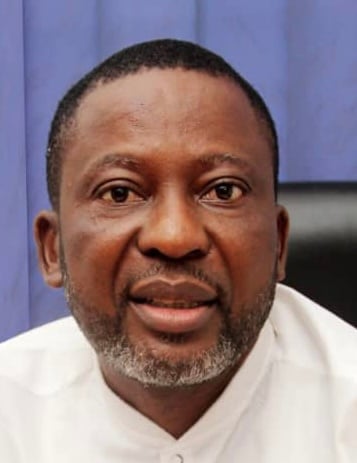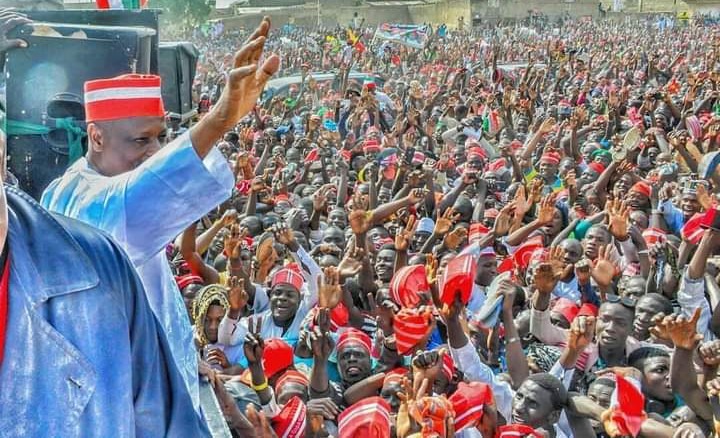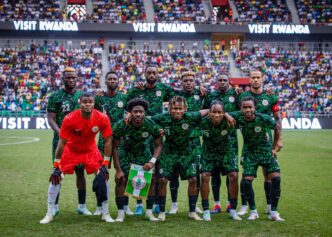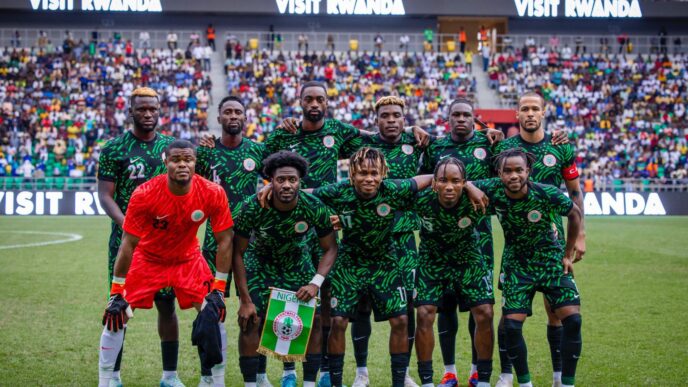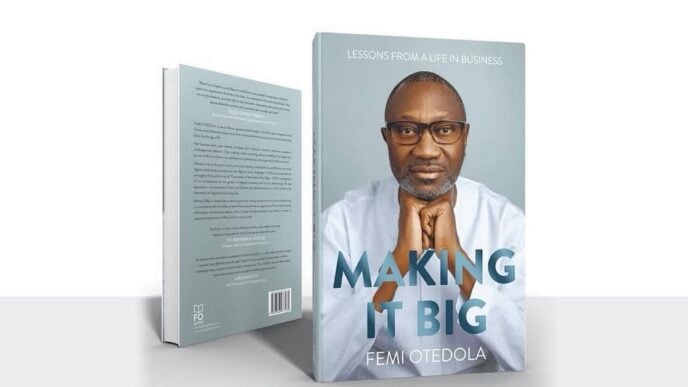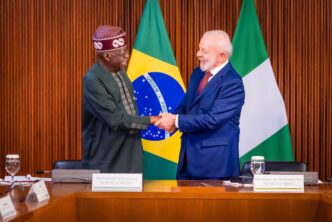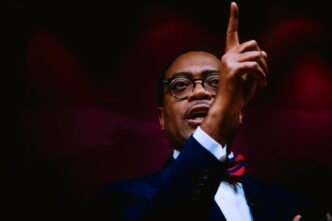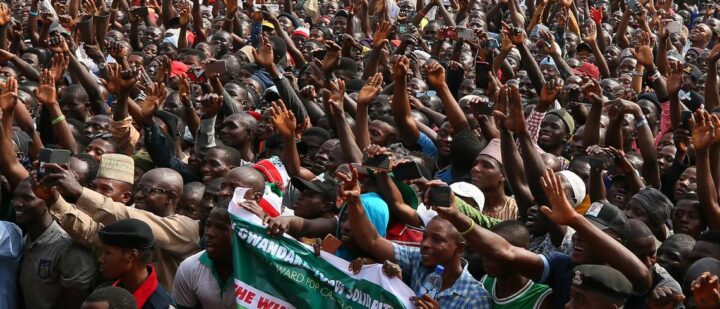With the 2027 general election looming, conversations about breaking the Nigeria’s two party duopoly dominated by the All Progressives Congress (APC) and the People’s Democratic Party (PDP) are gathering momentum. While the African Democratic Congress (ADC)coalition is perceived as the third force, one man whose political trajectory and impact deserves a mention in shaping the alignment and re-alignments towards 2027 is Senator Rabiu Musa Kwankwaso.
Senator Kwankwaso, former Governor of Kano state, former Defense Minister and the presidential candidate of the New Nigeria People’s Party(NNPP) in the 2023 Presidential elections is not just playing politics; he is reinventing it.
With the NNPP as his vehicle, Kwankwaso is quietly but steadily building what could become Nigeria’s most consequential third force, a political brand rooted in ideogy, discipline, and regional strength, now scaling toward national prominence.
The NNPP was founded in 2002 as a relatively unknown party with limited national presence. For years, it operated on the periphery of Nigerian politics, largely unknown beyond a few states in North West. Its fortunes changed dramatically in early 2022 when Kwankwaso, dissatisfied with the transactional politics within PDP and APC, embraced NNPP as the platform for his political renaissance.
Advertisement
Kwankwaso did not merely join NNPP; he re-engineered its structure, refined its ideology, and rebranded its identity. A major turning point came with the change of logo and repositioning of the party’s image, an aesthetic and strategic move aimed at signaling rebirth and national aspiration.
The new logo, bright with hope and bold in symbolism, became a rallying point for those disillusioned by the failures of Nigeria’s dominant parties.
The decision by Kwankwaso to contest the 2023 presidential election under the NNPP banner was not a whimsical gamble; it was a calculated move to mainstream the party. Though he did not clinch the presidential victory, the election marked NNPP as a serious contender and a party of the future. It garnered significant votes in the North, built a national conversation around its brand, and demonstrated that Nigerians were ready for a credible alternative.
Advertisement
Unlike many parties that vanished after electoral defeat, NNPP consolidated post-election, growing its structures, building grassroots networks, and sharpening its ideological message of education, equity, and economic reform.
In a political system where ideology takes a backseat to opportunism, defections and coalitions are often celebrated as smart moves. Many believed Kwankwaso would follow this familiar script: strike a deal, join the ruling party, or collapse NNPP into a mega-coalition.
However, at the 9th National Executive Committee (NEC) meeting of the NNPP held in Abuja recently, the former Kano State governor delivered a message that reverberated across the political spectrum: “NNPP is neither for sale nor a bargaining chip”. “It is a movement strong in ideology and formidable enough to win the 2027 general elections on its own terms” the national leader declared.
The party leadership at the NEC meeting also reiterated that its doors are open for people willing to join the party, noting also that it is willing to go into discussion with individuals or groups willing to join the party ahead of the 2027 national polls.
Advertisement
The outcome of the NEC meeting of the party in Abuja has laid to rest months of speculations and whispers which had grew louder among political analysts and power brokers that Kwankwaso, the face of NNPP, may abandon his platform to join the ruling APC or align with the emerging coalition seeking to unseat the government of President Bola Ahmed Tinubu in 2027.
For many Nigerians, the speculations that Kwankwaso may abandon NNPP seemed inevitable after all, defections have long been the norm in a political culture where loyalty bends to the gravitational pull of power.
The NNPP stand during the NEC meeting was more than a grandiloquence. It was a reaffirmation of Kwankwaso’s political wisdom and his unwavering commitment to building what Nigeria desperately needs, a credible third force that is not born out of convenience, but conviction.
Kwankwaso’s political story is not that of an accidental politician or a onetime election wonder. From his early days as a grassroots mobilizer in Kano to his tenure as governor where the Kwankwasiyya movement emerged as a socio-political philosophy, he has consistently demonstrated a rare blend of populism and pragmatism.
Advertisement
His politics is colored not by blind ambition but by structure, organization, and a philosophy of inclusive governance, a quality that has earned him loyalty beyond his home base.
Unlike the transactional politics typical of Nigeria’s dominant parties, Kwankwaso has crafted NNPP as a movement first, and secondly, a party and sanctuary for those weary of the corruption, nepotism, and ideological emptiness that define APC and PDP.
Advertisement
NNPP is positioned not as a splinter group born of political frustration but as a value driven platform with an audacious mission: to offer Nigerians a credible alternative to the status quo.
Unlike APC and PDP both criticized for ideological emptiness, NNPP positions itself as a value driven movement anchored on education as a panacea for development, Youth empowerment and job creation, security reform and community policing besides inclusive governance.
Advertisement
As a national leader of NNPP, Kwankwaso has repeatedly demonstrated his commitment to these ideals, both in governance and party organization. This consistency gives NNPP a unique narrative that resonates with Nigerians tired of recycled promises.
In a democracy fatigued by broken promises, voters crave integrity and purpose. NNPP’s rhetoric is not only populist but programmatic, anchored on Kwankwaso’s track record of building schools, empowering youth, and promoting policies that bridge inequality. If properly marketed, these values become NNPP’s differentiator in Nigeria’s cluster political horizon.
Advertisement
This trajectory is neither novel nor isolated. Around the world, history offers striking parallels: Bharatiya Janata Party (BJP) in India began as a regional alternative before becoming the nation’s ruling party under Narendra Modi.
The African National Congress (ANC) in South Africa transformed from a liberation movement into a political powerhouse with a strong ideological identity.
The Scottish National Party (SNP) in the UK leveraged regional identity to secure significant national influence.
Like these examples, NNPP is leveraging regional loyalty and ideological clarity to challenge a system that thrives on complacency.
NNPP’s ambition for 2027 is not a whisper; it is a declaration. The party is building structures in all 36 states, recruiting credible candidates, and refining its ideological message. Unlike other emerging platforms, NNPP has a tested leader, a loyal base, and a growing national footprint.
The real question now is not whether NNPP will be relevant in 2027, but whether it will change the rules of the game altogether.
Kwankwaso’s political career has never been a story of blind loyalty to the establishment. As former governor, senator, and minister, he has moved within the corridors of Nigeria’s most powerful parties, the PDP and APC but never lost sight of a bigger dream: to create a platform that embodies ideological clarity, internal democracy, and people centered governance.
By rejecting the easy route of assimilation into APC or any hastily assembled coalition, Kwankwaso is playing the long term game. He understands a fundamental truth often ignored in Nigerian politics: sustainable political relevance is built on structure, not shortcuts; on branding, not backroom deals.
The decision to stay independent and strengthen NNPP is not a gamble, it is strategy. A strategy rooted in his confidence that Nigerians are exhausted by the broken promises of the ruling party and the perpetual disappointments of the major opposition party. In this fatigue lies an opportunity: a hunger for a fresh narrative and a party that offers hope, not more of the same.
The story of NNPP’s rise is, in many ways, a study in how political power is built from the ground up. Kwankwaso began where every successful movement starts: his stronghold. In Kano, he entrenched Kwankwasiyya as more than a slogan. It became a lifestyle, with a network of devoted followers who share his ideals of discipline, education, and empowerment.
From there, NNPP spread into the North-West and North-East, winning seats in the 2023 elections and demonstrating that regional dominance can be a springboard to national relevance.
Successful political movements across the globe understand one truth: a party without a strong brand identity is a fleeting phenomenon. Kwankwaso seems to understand this intuitively. NNPP’s branding strategy leans on the red cap symbolism, a visual representation of resistance, progress, and identity. But beyond aesthetics, NNPP’s challenge and opportunity is to translate Kwankwaso’s persona into a scalable ideology that resonates beyond Kano, beyond the North, and into the heart of Nigeria’s diverse electorate.
Consider Emmanuel Macron’s La République En Marche in Francea centrist movement that shattered traditional party politics by appealing to reform minded voters.
Kwankwaso’s NNPP is attempting a similar disruption, seeking to break Nigeria’s entrenched two party hegemony with a fresh narrative: competence, credibility, and community.
The path is neither easy nor guaranteed. Nigeria’s political system is deeply wired for incumbency, patronage, and money politics. But history favous the bold. If Kwankwaso can consolidate NNPP’s current momentum, institutionalize its ideology, and forge alliances without diluting its core values, he could rewrite the playbook of Nigerian politics.
The question, then, is not whether Kwankwaso understands this mission his career suggests he does. The real question is whether Nigeria, battered and bruised by decades of misrule, is ready to embrace a homegrown alternative that speaks the language of progress, not politics as usual.
Kwankwaso is betting on yes and so, increasingly, are millions of Nigerians who see in NNPP not just a party, but a possibility.
Nigeria stands at a crossroads. The old order defined by APC and PDP has failed to deliver prosperity, security, and unity. The country cannot afford another wasted decade.
NNPP offers an alternative vision driven movement that prioritizes people over power, ideas over interests. But a movement is only as strong as its believers.
If Nigerians want change, they must own it. They must rally behind platforms that offer more than slogans, platforms like NNPP that dare to challenge the system and present a clear roadmap for renewal.
2027 is not just another election. It is a referendum on Nigeria’s future. The question is simple: Will Nigeria recycle failure or embrace a new political era?
Kwankwaso and NNPP are ready. But is Nigeria ready?
Kalu, a communication strategist, a leadership and good governance advocate dedicated to impactful societal development and can be reached via [email protected]
Views expressed by contributors are strictly personal and not of TheCable.
